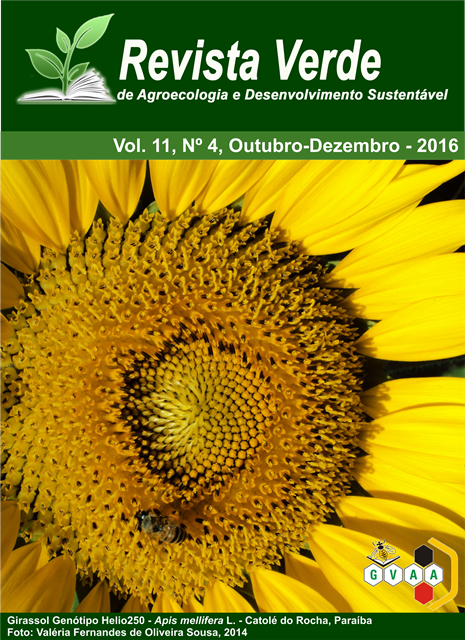Dieta de Leptodactylus macrosternum (Amphibia; Anura; Leptodactylidae) no Sertão da Paraíba, Brasil
DOI:
https://doi.org/10.18378/rvads.v11i4.4372Palabras clave:
Hábito alimentar, Anuros, Sertão paraibano.Resumen
Entender a ecologia alimentar de anuros é essencial para compreender a biologia de vida destes animais. Essas informações fornecem dados necessários sobre seu habitat, morfologia, fisiologia e comportamento. Nesse sentido objetivou-se analisar a dieta de uma população Leptodactylus macrosternum, da fazenda Cajueiro, município de Catolé do Rocha, Sertão paraibano. As coletas ocorreram mensalmente entre os meses de outubro de 2013 e junho de 2014, realizadas por meio de busca ativa auditiva/visual. Em laboratório, verificou- se os conteúdos alimentares até o nível taxonômico de Ordem. Foram identificadas 10 categorias alimentares, sendo sete pertencentes à classe Insecta, duas Arachinida e uma Gasthropoda, além de vegetais e terra/pedra. Os principais itens alimentares na dieta, segundo o Índice de Importância Alimentar, foram Coleoptera e Hymenoptera, seguidos de Odonata, Hemiptera e Orthoptera, não ocorrendo de modo geral modificações significativas no consumo dos itens alimentares. As alterações no consumo dos itens na dieta de L. macrosternum, possivelmente resultam da disponibilidade, associada a variações pluviométricas da região.
Diet of Leptodactylus macrosternum (Amphibia Anura: Leptodactylidae) in the backlands of Paraiba, Brazil
Abstract: Understanding the frogs food ecology is essential to understand the biology of life of these animals. This information provides necessary data on their habitat, morphology, physiology and behavior. In the study we analyzed the diet of a Leptodactylus macrosternum population, of the farm Cajueiro, city of Catolé do Rocha, wilderness region of Paraíba. The gatherings were executed between October of 2013 and June of 2014, by hearing/visual active search. In the laboratory, the food contents were analyzed in the taxonomic categories of Order. Were identified 10 feeding categories, being 7 belonging to the class Insecta, 2 Arachinida, 1 Gasthropoda, in addition to vegetables and ground/rock. The main food items in the diet, according to the Index of Alimentary Importance, were Coleoptera and Hymenoptera, followed by Odonata, Hemiptera and Orthoptera, generally not occurring significant changes in the consumption of the food items. Changes in the consumption of items in L. macrosternum diet possibly result from the availability, associated with variations in rainfall in the region.











